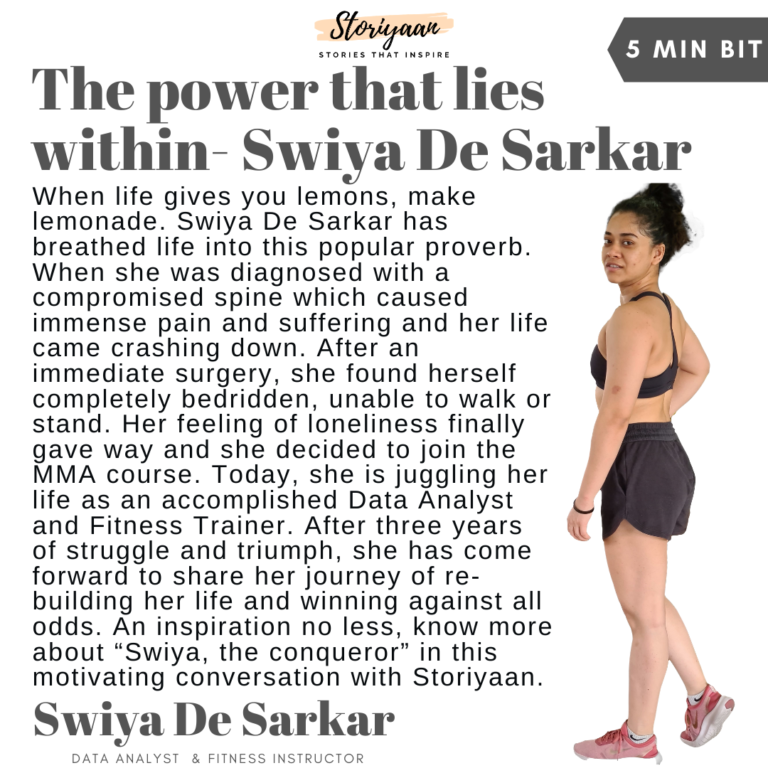When life gives you lemons, make lemonade. Swiya De Sarkar has breathed life into this popular proverb. When she was diagnosed with a compromised spine which caused immense pain and suffering and her life came crashing down. After an immediate surgery, she found herself completely bedridden, unable to walk or stand. Her feeling of loneliness finally gave way and she decided to join the MMA course. Today, she is juggling her life as an accomplished Data Analyst and Fitness Trainer. After three years of struggle and triumph, she has come forward to share her journey of rebuilding her life and winning against all odds. An inspiration no less, knows more about “Swiya, the conqueror” in this motivating conversation with Storiyaan.

Interview
Questions and answers
You mentioned an injury that you had incurred which turned into major surgery. How did the experience drain you emotionally and what turned out to be a ray of hope during those times?
My injury left me scarred emotionally. I was completely hopeless about the future, lost my interest in everything I used to love previously, and would cry at the drop of a hat. During those days, my passion for my work kept me going, I would work for long hours to read about the latest technologies and focus entirely on doing better in my professional life.
What made you stop taking the help of your counselor to battle post-surgical depression and what would be your advice to those who are battling it?
I stopped visiting my counselor as I realized that I was not ready to accept that help, nothing they said would get registered and I would ignore every piece of advice. So, I started working on that and fixed that myself. My advice to everyone struggling with any mental illness is that do whatever it takes to work on your feelings of hopelessness. Get professional help if you can talk to your close and dear ones, take breaks and always believe in yourself.
How did the strength and conditioning sessions aid your physical recovery and how did it aid in your confidence-building?
The training gave me a new purpose in life, it gave me a reason to be better and not feel miserable for once. It was a place where I could let my negative feelings out and feel calmer. I was able to progress through weights and workouts and found a new belief and confidence in myself.
How did being offered the role of a trainer make a difference for you and what was your strategy of dealing with clients who also had undergone physical injury?
My role as a trainer made me more responsible as whatever I say will have a direct impact on my client’s health. The workout techniques and strategies depend on their injuries and the requirements – whether it is rehabilitation or weight management, the needs and preferences are vital to make the body sustain beyond the injuries.
There are some common beliefs among people that women tend to develop a more “manly” body when they lift weights or that it is difficult for women to gain muscles or be ripped without steroids. What is your opinion on this?
I feel the meaning of “manliness” has been twisted in our society as all genders can be muscular. Women have to work extra hard to develop muscles but through proper training, you can get them built. If the training or a workout makes you happy and enhances your fitness, you should ignore what society says. If you want to see faster results, there are alternatives that can enhance your build but you would have to then consider the consequences as well. Some changes are permanent. We also have to think about how sustainable they are or if they can be good for the long run as well.
What is the most common question that you receive from new clients when they join the gym and how do you help them get over their misconceptions?
The most common question that I receive is “I don’t eat that much I don’t know how I gained weight” as they don’t realize how much they are eating because they never cared to calculate. People don’t realize that it isn’t the quantity but the calorific value of the food that determines how much food they are taking. They might take a sandwich and feel it is a light meal but then it can be the most calorie-heavy food out there. So, that is the most common misconception.
You have continued to work out at home during the lockdown. How has that turned out to be a source of optimism in your life during this phase and how do you manage to keep lockdown blues at bay?
As a very organized person, I plan my day to the last second and manage my schedule effectively. I start my day with a workout that keeps my spirits high and sets challenges to achieve a better form, better timing, and better energy. I am fortunate to spend the lockdown with my family. We have created a routine of spending time together every day after work when we play board games, have conversations and interact. I feel close to my parents and that has kept the lockdown blues away.

